Search Location Drastically Affects Local Rankings

Table of Contents
- What Is Local Search and the 3-Pack?
- Why Don’t I Show Up in the Google 3-Pack?
- Methodology: What Did We Do for the Local Search Testing?
- What Did the Results Tell Us?
- How Much Do Location, Distance and Density Matter?
- Does Your Device or Search Phrase Matter?
- How Does Google Decide?
- What Really Matters for Local Rankings?
- What does this all mean?
You have a beautiful new website. You’ve claimed your Google Business Profile. You’ve been blogging and posting to Google regularly. You bought a subscription to MozLocal to help improve your local presence. You’ve kept up to date on best practices, but you’re still not ranking in local searches throughout your town. What gives? “Location” may be your biggest hurdle.
This blog was co-written by Andy Simpson.
What Is Local Search and the 3-Pack?
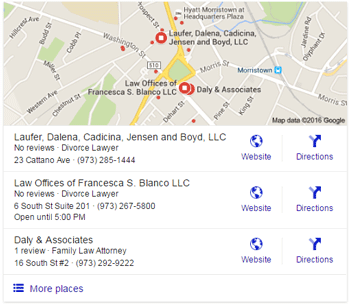
Very simply, “local search” refers to a user performing an online search with the intent of finding a local business near them. Searching for “electrician in Chicago” or “divorce lawyer near me” are both examples of local search. When this type of search is performed, Google will provide the user with a “3-pack” of local results, with an accompanying map at the top of the page. These local results are shown just below the paid ads and just above the organic results. Google is automatically pulling in these three local business results as the most relevant, based on a variety of factors.
This is important to know because people who are performing these searches are more inclined to click on these local listings than the organic listings below. There are two reasons for this: (1) 3-Pack results are more visual. Without any additional clicking, they allow a user to instantly see where the business is located on the map, along with reviews, hours of operation and a phone number, and (2) These results are closer to the top of the page. People want quick and easy answers, so why would they go any further than this visual pack of the “best businesses” that are being displayed?
Now that you understand the importance of 3-Pack results, you may be wondering how to get your business to appear there. Due to Google’s ever-changing algorithm and its “secrecy,” local search is something that we’ll never fully understand. Google tells us, however, that local search results are based on three factors:
- Relevance
- Distance
- Prominence
Which matters the most? Do they all hold equal weight? Is “distance” the most important? How exactly does Google determine “prominence”? How can you improve your “relevance”? These are questions that we ask ourselves every single day as we drive ourselves crazy optimizing websites, creating local listings, and building strategic links, hoping to crack the code of improving local rankings.
We personally set out to find the answer to the age-old question: “How do I improve my local ranking?” Or, as a client would say, “Why am I not showing up in the map section at the top of Google?”
Why Don’t I Show Up in the Google 3-Pack?
Our research was prompted by a client who sent us an email: “I’m sitting in the courthouse; why am I not showing up when I do a search for injury lawyer?” It would make sense that someone in or near a courthouse would be seeking legal representation, so this attorney obviously wants his law firm to show up. Why, then, doesn’t his firm’s local listing show up in the 3-pack rankings when he performs a search from the courthouse when the firm does show up in searches conducted seemingly everywhere else across town? The firm shows up when searching for “injury lawyer in [city]” and the courthouse is in the same town and has the same zip code. The firm shows up in organic results as well. So, why doesn’t the law firm show up in local searches from this location? Why are they not in the 3-pack near the courthouse?
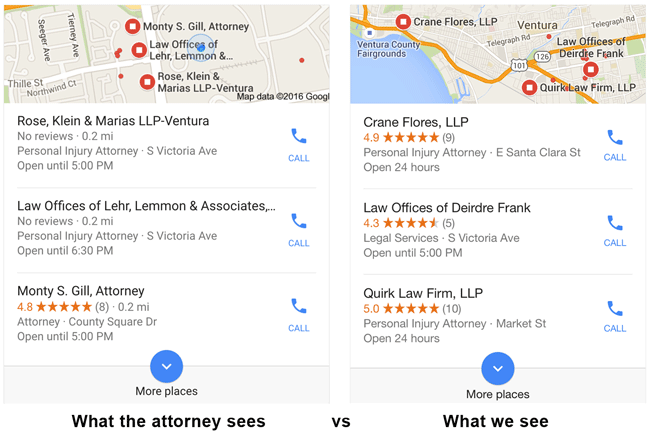
This stumped us for a bit, because the firm does have a great SEO foundation and a solid local presence, so they really should be showing up all over town, regardless of where the search takes place. Plus, the firm shows up when the attorney does the same search from his office, which is only a few minutes away from the courthouse. That got us thinking: maybe a user’s actual search location has a bigger influence on local results than we had thought. We tested out that theory — and what we found may surprise you.
Methodology: What Did We Do for the Local Search Testing?
It’s important to realize that to emulate local results from a specific location, you actually have to go out and do it yourself: go to the location, perform the search, record the data, and then analyze the results. Using a local search tool won’t be 100 percent accurate (or what you’re looking for), because these tools emulate a search conducted from the city center as opposed to an exact location within that city that you are targeting. This means that the tools give a different result than what is seen by a searcher who is actually standing on location.
For example, the Ad Preview and Diagnosis Tool did not give us the same results as the field testing did. That’s because you can’t select an exact location within the tool — just the city location. This is similar to most keyword tracking tools. At a high level, these tools can give you a general understanding of how you are performing, but you are not able to hone in and target exact locations within the city limits to really understand your local presence.
This is exactly why we had to go out and do the testing ourselves. Our objective was to find out how much the searcher’s “location” really mattered to local search results. We went out to five different locations throughout Morristown, New Jersey, and searched for “divorce lawyer Morristown” to see how the results differed.
Why did we choose Morristown? We liked this location because it gave us a good sample size. There are lots of lawyers scattered throughout all points of the town, and its population (approximately 18,500) is fairly average, closely resembling that of Naples, Florida, and San Marino, California — a decent size town, but not a major city.
It was also important for us to keep our search results unbiased, so we used brand new Gmail accounts that had no search history, while also cleaning out cookies/history after every search and browsing in incognito mode. This gave us the best shot at Google treating us like a “new person” for every search.
What Did the Results Tell Us?
The results were astonishing. The physical location where the search was performed and its proximity to the local business mattered tremendously — much more than we had expected. You might think that since we are performing the same exact search, within the same town, and telling Google that we wanted Morristown results, Google would give us the same results no matter where we were standing. Google should be able to figure out that each search had the same intent. That was not the case.
Here are the five different locations in Morristown that we tested:
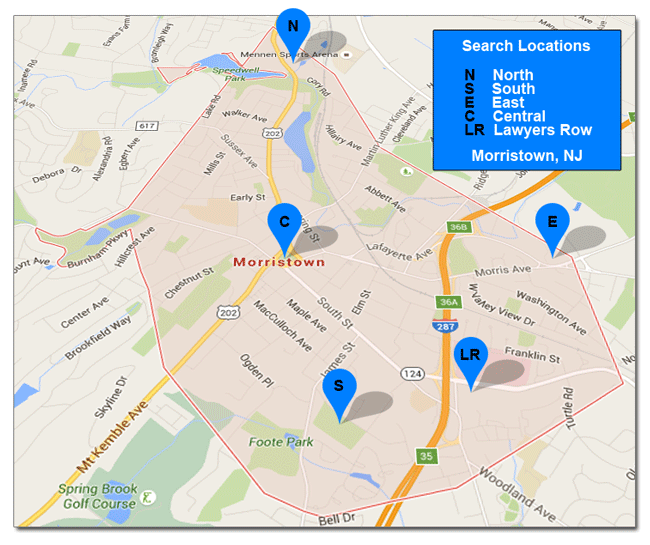
From each of these five locations, we searched for “divorce lawyer Morristown” using a mobile device. Take a look at how the results differed based on each location within Morristown:
Why is there such a difference in the results throughout town? Location. Location. Location.
How Much Do Location, Distance and Density Matter?
When we performed the search from the north end of Morristown, Google searched up to a mile away for results, because that’s how far it felt it needed to go to pull in “good/relevant” results. But when we did a search on Lawyers Row — our name for an area of Madison Avenue that’s home to many law offices — Google only searched 250 feet for results! Google felt that it had enough information here and didn’t need to search any further.
This tells us that results are extremely biased toward:
- Where you are standing and how close you are to local businesses (distance & location)
- How many of those specific businesses are in the area (density)
Why does Laufer, Dalena, Cadicina, Jensen and Boyd, LLC show up in local results in north Morristown? The reason is there are no divorce lawyers in that area, and the firm happens to be located at the northern end of the central part of Morristown. They are benefitting from a less dense population of lawyers in the area. The firm also appears in central Morristown searches because that’s where their office is actually located. But when you get to southern Morristown, they are nowhere to be found. That’s because there is such a high concentration of lawyers and law firms located in that part of town, they don’t stand a chance, regardless how strong their “local presence” is.
We also found that when you are located in an area with a high concentration of lawyers, the results are even more sensitive. Let’s take the Lawyers Row example from above. There are two professional services buildings located right next to each other, each housing 5 to 10 different law firms who practice divorce. This seemed to be a perfect spot for testing.
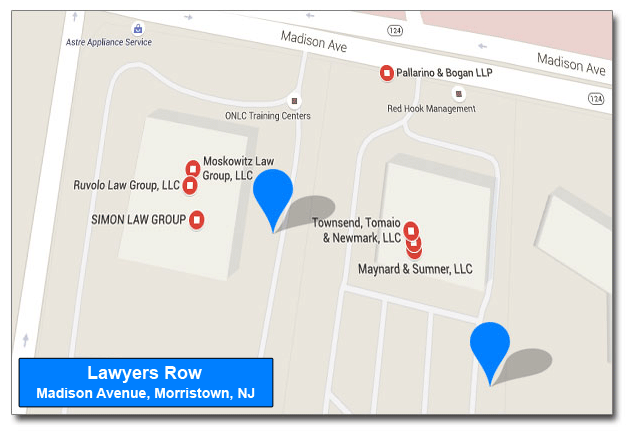
We wanted to see who would show up for “divorce lawyer” searches from that location. While we were testing, we noticed that even the slightest bit of movement changed the results. When we performed the search in between the two buildings, we got different results from those when we stood in front of the east building and searched for the same thing. How does that happen? We only moved about 50 yards and the results changed! Check it out:
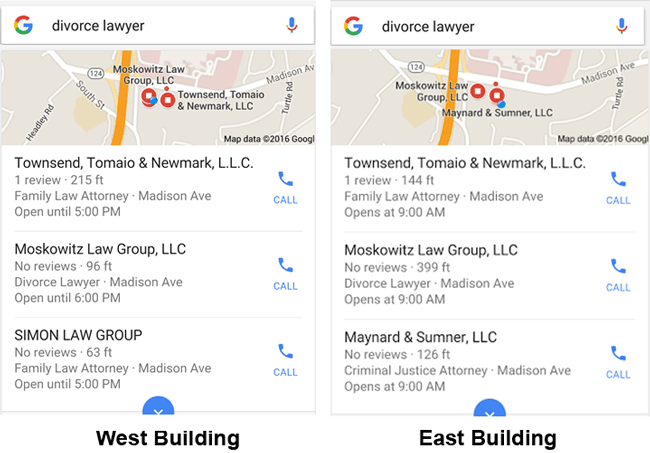
Does Your Device or Search Phrase Matter?
Your location isn’t the only thing that can change the results. We also did local testing across multiple devices and networks, using the same keywords from the same location. Those results differed when we used a cellphone as opposed to a laptop connected to a public Wi-Fi network. We also used different (but similar) search terms from the same location and same device, and — you guessed it — those results varied as well. We were astounded.
Device example: How in the world could three people who are sitting in the same Starbucks perform the same exact search and get three different sets of results? Because they connected to the internet differently? While this may not make sense to us, it appears to be the case.
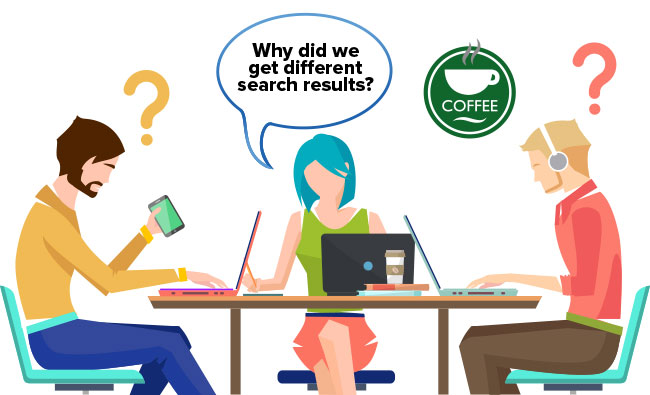
Keyword example: Or, why would “divorce lawyer Morristown” and “divorce lawyer near me” return different results for two people sitting on the same bench in the same park? What is Google’s reasoning for this?
Why can’t Google figure this out? At the end of the day, isn’t each searcher trying to get the same result? We may never get a good explanation from Google on this, but it is something we need to be aware of. Let’s look at how this all relates back to location.
Why does the network that your device is connected to matter when you’re using the same keywords? Because when you are using a cellphone (with location settings on), your exact location is being reported, and your results are more hyper-local. When you are connected to the Starbucks Wi-Fi, your location is set based on their router, not your precise location, thus skewing the results for a broader reach. This appears to be why the local results come back different.
Changing the specific keywords (even if they are similar) also changes the results — for example, “divorce lawyer Morristown” vs “divorce lawyer near me.” The latter gives you a broader search, as opposed to “divorce lawyer Morristown,” which hones in on your location because you’re telling Google to search Morristown.
Different results from the same location? This drives us nuts. Here’s a visualization of those two scenarios from above:
Starbucks (central Morristown)
The same search, from the same location, from three different devices/networks, returns three different results:
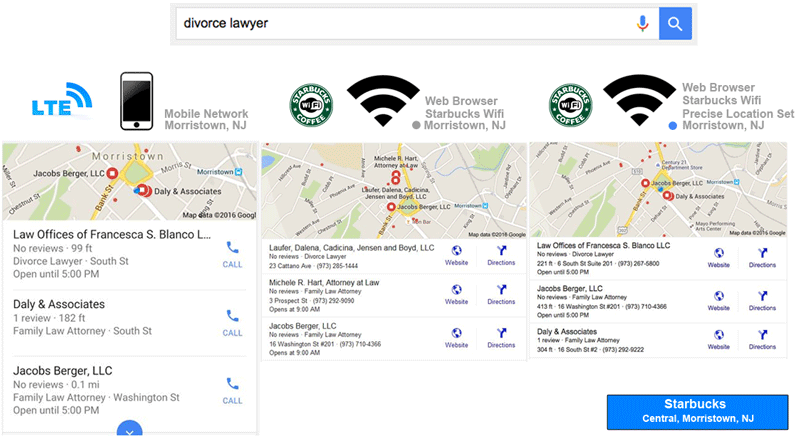
Lidgerwood Park (south Morristown)
Three similar searches, from the same location and device, return three different results:

How Does Google Decide?
We couldn’t stop there. We couldn’t just chalk everything up to location. We know that it is a huge part of the ranking algorithm, but it’s not the be-all and end-all, because in some locations there are more than 10 businesses, so Google has to choose the best ones to display. Google also has to rank #1 over #2 for a reason, while also leaving #4 off the list for a reason. We set out determine how these decisions are made.
Let’s go back to what Google tells us. They rank local listings by relevance, distance and prominence. We already discussed location (“distance”) and how that affects results. Location notwithstanding, it boils down to relevance and prominence. Since the results are all divorce lawyers, and we are looking for a divorce lawyer, there isn’t too much for us to explore in the “relevance” category.
That leaves “prominence.” What the heck is that? How can we measure that? Can we improve on it?
Google tells us that prominence is made up of four basic things:
- How well-known a business is, in the online and offline world. This is obviously something that is hard to measure, and since we can assume that none of these attorneys are super famous or relevant to historic events or places, everything is equal.
- Google reviews and score. This makes sense, because Google should be showing you higher-quality results, and it can use reviews and scores to measure those. However, we’re not buying it — for now at least. Of the twenty or so divorce law firms that we found, most had no reviews. Only one of them had more than one review, and that business listing never showed up in the local results! So we are going to put this aside for now, as we don’t see it as a crucial ranking factor, yet.
- Information from links, articles and directories. This makes sense too and is something that we can tangibly measure. We can actually count and see the number of links a website has, the directories they are listed in, and the articles they publish or are mentioned in. We’ve also been told this from day one: make sure your NAP (Name, Address & Phone) is consistent across the web, and make sure you have good content and links if you want to succeed! We found that this was actually true for the two businesses that consistently showed up in the local rankings. Those two had the greatest number of supporting divorce pages on their website while also having the most backlinks, even though their “local scores” (Moz, Yext) weren’t the highest. This tells us that content and links carry the most weight here.
- Organic position. We get it: Google wants to somehow tie your website to your local business listing and reward those who follow their best practices. But how much weight does this actually have? This gets kind of tricky because we’re seeing mixed results. Looking at overall scores, we see that the top two performing businesses in this local search across Morristown also had the most organic page 1 results. That makes sense. But did we finally crack the code? Probably not. If that were true, then we would have seen the Salvaggio Law Group show up in the local results at least once, because they showed up twenty different times in the organic results through all of our testing! If organic position mattered that much, then they would have shown up in local. We weren’t 100 percent convinced yet.
More specifically, for the search term “divorce lawyer Morristown,” the Salvaggio Law Group LLC showed up every single time in the organic results (desktop and mobile), but never appeared in the local 3-pack, whereas Jacobs Berger LLC, Daly & Associates, and the Ruvolo Law Group all showed up twice in local results, but were never found in organic results. Quite the quandary.
The Salvaggio Law Group LLC is located in Morristown, they have a verified Google Business Profile (GBP) listing with correct categories, they have the most reviews out of anyone we researched, their title tag for their linked GBP page targets “Morristown Divorce,” they have the second oldest domain with a zero Moz Spam Score, and have 11 supporting divorce pages on their website. So, what gives? I’m not buying into “organic position” as being a huge ranking factor in local search. In fact, we’re putting it toward the bottom.
What Really Matters for Local Rankings?
First off, it’s all about location, which is broken down into two parts: (1) how close you are in proximity to the searcher, and (2) how dense an area you are in. Once you wrap your mind around how important location is, and figure out if you are “eligible” to show up in that area, the second most important factor with local search appears to be your website. Not your number of reviews, not your AV rating, not your Yext error rate, and not even your primary GBP category. We found this to be surprising. Out of all the things that we took into consideration for the well-ranked businesses, their website seems to matter the most here. What part of the website, you ask? It looks like it’s all about the supporting pages of content you have, the specific keywords on those pages, your backlink portfolio, and how long you’ve been around (domain age of website). These all appear to be the highest-weighted factors for determining who shows up locally, when talking about “prominence.”
After we found all the top-ranking law firms in Morristown for our searches, we took a look at everything about them — from their MozLocal Score to the number of backlinks their website has — trying to find corresponding sets of data. Trying to find similarities for success. Trying to find gaping holes. Here’s a basic breakdown of what we found for this example (divorce in Morristown):
Factors that seem to positively influence rankings:![]()
- More mentions of “lawyer(s)” or “attorney(s)” in the content of the linked GBP page
- Higher number of supporting divorce pages on the website
- Older domain age
- Having “Divorce Lawyer” or “Family Law Attorney” as the primary GBP category (doesn’t matter which one, as long as it was one of the two). Many non-ranking businesses have “Law Firm,” “Attorney” or “General Practice” listed as their primary category.
- Lower Moz Spam Score
- More linking domains
- More total links
- Having a mobile-friendly website
Things that seemed to have little to no effect on local rankings:![]()
- Keywords in domain name
- Whether your primary GBP category was Divorce or Family Law
- Number of Google Reviews
- Google Review Score
- Links pointing to your website from your GBP listing description
- H1 tag of linked GBP page
- The amount of times “divorce” was found in the content of the linked GBP page
- Linking your website back to your GBP page
- Number of posts on Google+
- Having a rel=”publisher” on your website
- Number of times listed in organic results
- Yext Error Rate
- Domain authority
- Page authority
- Responsive website
Many metrics ended up being inconclusive, and we weren’t able to tell if they were a direct influence or not. That could be because our sample size wasn’t large enough, or because there wasn’t enough variance between the businesses to test that metric. Some of those metrics included secondary GBP category, type of linked page from GBP (home vs landing), structure of the title tag of that linked GBP page, mentions of “Morristown” in the content of the linked GBP page, and having a secure website (HTTPS). Also, it’s hard to tell if just one of these metrics can actually sway entire results. As always, it’s best to use your own judgment when working on your website and local listings — and to also test different things out. What works for businesses in Morristown, New Jersey, might not work for businesses in Greenwood Village, Colorado.
What does this all mean?
Our goal in field-testing was to test our hypothesis and see if search results actually do change based on where you were standing throughout the town — and if so, how much.
Well, the results do change — a lot. We found out that location & distance are huge factors when Google is providing you with results. You can be standing at different points throughout the town and get different results, even when searching for the same thing. Along the way, we found out that other elements play a role in local rankings, such as density, device connection, and search phrase.
Density mattered tremendously in the Lawyers Row example from above. In this area, there is a clear saturation of divorce lawyers, so the results Google provided were limited to a small radius around the searcher rather than the entirety of the town.
We also found out that searching from a mobile device (as opposed to a laptop on Wi-Fi) will give you different results, because Google is basing these results off the location of your precise device connection.
While doing this testing, we also found out that tweaking the search phrase changes the results as well — even if the search intent was the same.
We wanted to find out why Google would have so many different results for basically the same thing. Well, we found out that location is the strongest factor when Google is providing you with results. Then we wanted to know what else factored into it. Why else did these specific results show up? Part of the equation is “prominence,” but how important is that? We found that only parts of that metric are important. Things like the amount of content on your website and how old your website is matter more to Google than how many reviews your business has or how accurate your business information around the web is. This was shockingly different than the popular Google Rankings Factors that govern our SEO practices today.
As a law firm — or any small business, for that matter— you must also realize that you can’t be listed everywhere, and that there is no “quick fix.”
- You can’t rank locally for a city that you’re not located in.
- You can’t check off the x, y, and z in your local ranking factor checklist and expect to appear in the local results. As you can see, it is dependent on too many factors dictated by the searcher, not the webmaster.
The reality is that you’ll need to do x, y, and z and monitor the way your visitors are searching and adjust. Only then may you have a good shot at ranking locally. Good luck if you’re located in Manhattan.
Keep in mind that nothing is guaranteed — and Google changes every day! What constitutes best practices today might not be helpful tomorrow. But at Martindale, it’s our job to keep up to date with these practices.
Stay current with Google’s best practices and helpful legal marketing strategies here: Legal Marketing Tips
Data collection and analysis was done on March 9, 2016.










